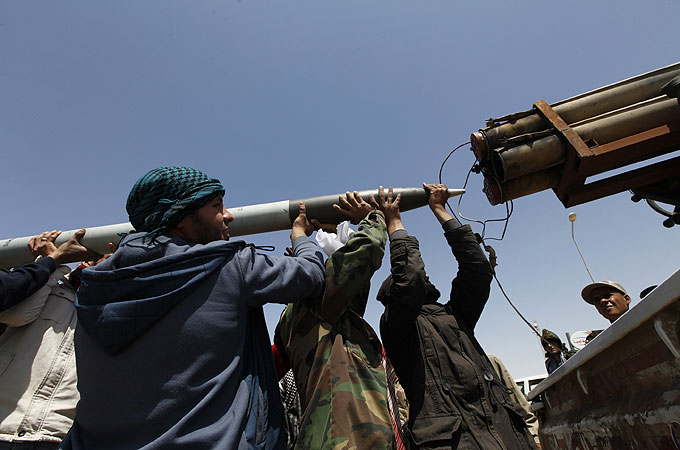Gaddafi forces take Brega
Rebel forces retreat over 20km east towards Ajdabiya, as Gaddafi troops mount fresh offensive to take key oil town.

 |
| Rebel forces were forced to retreat from Brega after having made some gains [Reuters] |
Libyan rebel forces have abandoned the oil town of Brega and are heading east toward Ajdabiya in the face of a renewed offensive by troops loyal to Muammar Gaddafi.
Both sides exchanged heavy fire on Tuesday, but just a day after rebels had taken over a residential part of the city, they were forced to retreat.
Opposition forces said they came under rocket and artillery fire while they attempted to fight back with mortars and rockets of their own.
 |
| Click here to follow our Libya live blog |
“When you see this, the situation is very bad. We cannot match their weapons,” said Kamal Mughrabi, 64, a retired soldier who joined the opposition army. “If the [coalition] planes don’t come back and hit them we’ll have to keep pulling back.”
Early in the day, a coalition airstrike targeted eight government vehicles that were advancing on opposition positions, rebel officer Abdel-Basset Abibi said.
Al Jazeera’s Hoda Abdel-Hamid, in Ajdabiya, reported that opposition forces had been pushed back 20-30km east of Brega towards Ajdabiya by the Gaddafi forces’ mid-morning offensive.
“Since this morning we were trying to get as close as possible to Brega. We reached the junction on the road that would lead inside that town, but since mid-morning, opposition forces have been coming under a rolling artillery and mortar barrage,” she reported.
Brigadier General Mark van Uhm, NATO’s chief of allied operations, said that NATO’s new “number one priority” was the western town of Misurata, where residents say they have been besieged for weeks by pro-Gaddafi forces.
“Misurata is a number one priority because of the situation on the ground over there. We have confirmation that in Misurata tanks are being dispersed, being hidden, [and] humans being used as shields in order to prevent NATO sorties to identify targets,” he said.
Van Uhm said that Gaddafi’s troops have been adjusting their tactics to deal with the threat from coalition airstrikes, travelling in trucks and light vehicles to the front line and hiding their tanks and armoured vehicles from sight.
He said NATO had so far taken out 30 per cent of Gaddafi’s military power, and had struck targets near Misurata on Monday.
Rebel oil export
Meanwhile, the rebels plan to load their first oil shipments on Tuesday.
The tanker Equator, which can carry a million barrels of crude, was due to arrive at the eastern port of Marsa el Hariga, near Tobruk, satellite ship tracking data showed even as a Suezmax tanker docked at the port of Tobruk.
| IN VIDEO |
|
Al Jazeera’s Laurence Lee reports on |
A full load of oil on either tanker would be worth millions of dollars, helping the rebel leadership to pay salaries and bolster its image as a potential government capable of taking over.
The last oil shipment to leave Libya was on March 18.
It is unclear at the moment who is buying the oil, though the Suezmax tanker is flying under a Liberian flag, and the Equator is operated by a Greek company.
The frontline in the conflict has been bogged down around Brega for nearly a week, with Gaddafi’s advantage in tanks and artillery cancelled out by NATO-led air strikes which effectively back the rebels.
After a series of rapid rebel advances followed by headlong retreats, the pro-democracy fighters had at least held their ground in this oil town for several days, putting their best trained forces into battle for the town and keeping disorganised volunteers away.
Abibi, the rebel officer, said the two sides battled inside the city until nightfall on Monday and then the rebels moved back to the outskirts. The night passed without much incident, until the coalition airstrike on Tuesday morning.
On Monday, columns of opposition fighters drove up the main coastal highway, regaining ground they had given up the day before, but the effective use of artillery and landmines by Gaddafi’s troops kept them at bay.
Tuesday’s Gaddafi offensive, however, broke the pattern.
“We haven’t seen such a push [by Gaddafi forces] for a few days, over the past few days it actually seemed as if the opposition forces were able to hold some sort of position around the town of Brega. Well, today the situation was completely different. The Gaddafi forces were much more aggresive than they had been in the past days, it seem that maybe they had received new supplies, but certainly they have been pounding much more intensely than over the past few days,” our correspondent said.
Mustafa Gheirani, a spokesman for the opposition’s Transition National Council in Benghazi, said that while “setbacks” had been suffered, the opposition would fight on.
“There is no revolution without setbacks. But the people will win. Gaddafi cannot rule Libya with his machine – his militias and his mercenaries … We are committed to fighting this tyrant, and either we will drive him out or he will rule a country with no people in it,” he said.
Christopher Stevens, the former deputy chief of the US mission in Tripoli, has now arrived in Benghazi to hold talks with members of the opposition’s TNC. The US has not formally recognised the TNC as Libya’s legitimate government, as several other countries have, and Stevens is in the country to “get to know [its] members”, a US official told Reuters.
On Tuesday, Geoff Morrell, the Pentagon’s spokesman, said the US was still undecided on whether or not to help arm the rebels, but would be discussing providing “non-lethal” assistance in the coming days.
General Carter Hamm, the US general in charge of Africa Command, under whom US military operations in Libya fell, was to testify before US lawmakers in Washington DC on Tuesday.
Stalemate
In the Libyan capital,Tripoli, meanwhile, angered by fuel shortages and long queues for basic goods caused by sanctions and air strikes, some residents began openly predicting Gaddafi’s imminent downfall.
Mussa Ibrahim, a Gaddafi spokesman, said Libya was ready for a “political solution” with world powers and offered a “constitution, election, anything. But the leader has to lead this forward”.
Libyan Deputy Foreign Minister Abdelati Obeidi ended a trip to Greece, Turkey and Malta to set out the government position.
Turkey is expecting an envoy to visit from the opposition in the coming days and is listening to both sides.
“Both sides have a rigid stance,” a Turkish Foreign Ministry official said after Obeidi’s visit. “One side, the opposition, is insisting that Gaddafi should go. The other side is saying Gaddafi should stay. So there is no breakthrough yet.”